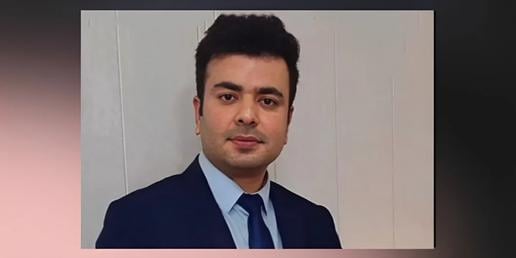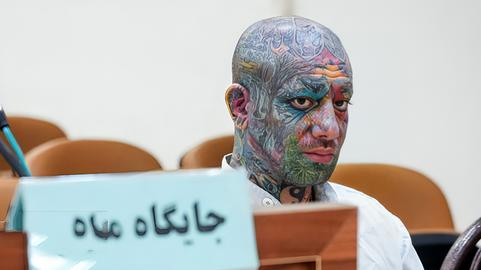
Last Thursday, prison guards launched a brutal attack on inmates at Evin prison’s Cell Block 350. Reports of the violence have met with widespread outrage, including from family members of prisoners.
Among those held in the block is political activist and head of the youth branch of the Iran Freedom Movement, Emad Bahavar, arrested on March 12, 2010 and sentenced to 10 years’ imprisonment for "conspiring against the national security of the country".
Bahavar’s letter from Evin prison, published here, is a firsthand account of the April 17th raid, exposing prison guards’ use of violence and absolute disregard for prisoners’ rights. The letter speaks for itself.
Known for his support of Mir Hossein Moussavi in the 2009 disputed election, in 2013 Bahavar showed his support for Hassan Rouhani via an open letter.
Iranian authorities, including the head of the Prisons Bureau, have denied reports of violence in the Tehran prison last week, dismissing claims as counter-revolutionary propaganda promoted by the BBC and the Voice of America.
For many, Rouhani’s commitment to human rights reform, put forth in his Citizenship Rights Charter in November, now appears to be a distant memory.
Letter From Cell Block 350 by Emad Bahavar
My whole body is aching. Batons were something that I had not experienced before.
I was arrested immediately after election day in 2009, so I did not have a chance to participate in demonstrations, or to witness that violence. When seven or eight people, each weighing more than a hundred kilos, throw themselves on your head and attack you with their fists and legs and batons, you don’t feel anything after a few minutes. You don’t even notice whether bones in your body are broken, or whether you are injured and bloodied. Only an hour after the beatings do you regain your wits and think about checking your body, inch by inch, to see what has happened to you.
As well as the guards, there were there were several plainclothes agents involved in beating inmates: one weighed about a 120 kilos, was fat, had a relatively long beard and wore a white collarless shirt that hung over his pants; another weighed around 130 kilos, had an athlete’s body and ears that stuck out. He was a little taller than the others and wore a white and pink shirt. Another weighed around 140 kilos, was about two meters tall, and wore dark glasses, a mask and a suit. The rest of them weighed around 100 kilos each, looked like body builders and wore tight jeans and sneakers.
I was on the floor above and at first, I was not aware of what was going on downstairs. I heard the voices of my fellow inmates, getting louder and louder by the second. I walked towards the door to see what was happening.
I heard the warden shouting, “Beat them!” Thirty or 40 baton-wielding guards and a few plainclothed men rushed downstairs. One guy – the one who weighed around 120 kilos – was in a rage. He took off his jacket and began whirling his baton around his head, shouting and cursing. For a moment it reminded me of videos from 2009 [following the disputed election]. These were like the guys who had beaten people in the streets. I took off my watch, threw it on the ground and approached the warden. “Why are they beating them?” I shouted.
Their interpretation of “why are you beating them?” seemed to be: “Why aren't you beating me?” Suddenly, guards rushed towards me and forced me to the other side of the ward, kicking and slapping me the whole time. One warden stood before me and asked me who I was. “Emad Bahavar, one of Mr. Moussavi’s staff,” I answered. The 120-kilo guy hit my face with his fist. They started cursing Moussavi. One warden said that Moussavi and his wife were sissies who were hiding in a hole.
"We Have Been Standing for Five Years"
The man who weighed 130 kilos ordered me to sit, but I did not budge. I was hit by a barrage of fists, kicks and batons and fell to the ground. I got myself up and stood in front of one of the wardens, gazing into his eyes. “Lower your head! Don’t look into my eyes,” the 120-kilo man shouted. I stayed as I was. One of the men grabbed my legs, lifted me up and threw me to the ground. Another barrage of fists and kicks and batons followed. Again I lifted myself up and stood facing the warden. “We have been standing for five years,” I said.
As time went by, more men arrived. There were maybe 200 of them. A commander shouted out that if a guard didn’t want to go downstairs, he didn't have to. One by one, inmates were forced to the other side of the ward and handcuffed from behind. Some had bloody faces and could hardly walk. Others were beaten so badly that they could not walk at all and were carried in, held by their arms and legs. They brought in about 30 prisoners, and I recognized three of them: Khalghati, Ebrahimzadeh and Fouladvand.
Everyone was blindfolded. They brought a blindfold and a pair of handcuffs for me too. I resisted a little and argued some but it was of no use. I had no energy left.
They lined everybody up alongside the entrance to Cell Block 350—blindfolded, handcuffed and facing the wall. Some were moaning. People were attacked with batons from behind. The moans grew louder. The wardens formed a tunnel between the cell’s main door and a waiting minibus, kicking and hitting people as they moved them towards the bus. Everyone was loaded on, and blood lined the floor of the vehicle.
Inmates began shouting out their names: Mohammad Davari, Gholamreza Khosravi, Mohammad Sadigh Kaboodvand, Mehrdad Ahankhah, Majid Asadi, Soheil Arabi...
Somebody must have intervened on my behalf because soon my name was called and I was pulled off the minibus. The warden delivered a rousing speech against “sedition” and Moussavi and talked about the strength of the system. He went to some effort to make me understand that he had done me a great favor and if I misbehaved again, I would come to a sticky end. I murmured a few sentences into his ear and reentered the ward, which was still in chaos.
The 130-kilo guy brought me a glass of cold water. Because I was injured, the provost transferred me to the prison’s clinic. Fellow prisoner Esmail Barzgari had arrived before me. He had broken ribs. They brought in [lawyer] Omid Behroozi later, with a ruptured wrist and blood all over him. Kamiar Sabeti was brought in with a heart condition.
I heard later that they had discovered a number of mobile phones and MP3 players. Phone lines to the ward had been cut off five years ago. All this show of force was because a few people wanted to hear the voices of their families or sought a little bit of tranquility from listening to music.
In Cell Block 350, love and music are contraband.
The Ache of Memory
My body aches. I don’t mean from bruises on the wrist caused by metal handcuffs; nor do I mean my aching left ear or neck as a result of hard blows to my head; nor do I mean the injuries to my tongue because it was pressed between my teeth when they were beating me; nor the bruises on my back; nor the aching waist and knees as a result of repeated kicking.
These pains are not significant; they will soon go away. This pain is entirely different. Spending years in prison has made us forget about the wounds inflicted in 2009. We had forgotten about the pain of our grieving parents. We had forgotten the pain caused by those lives that were lost: Neda [Agha-Soltan] and Sohrab and Ali and Taraneh and other martyrs. We had forgotten the pain that people suffered from bullets and batons and cutlasses and the brass knuckles of plainclothes agents. The events at Cell Block 350 on April 17th reminded us of all of this. And it brought back the pain.
When Rouhani came along, we said, if people are spared some pain, if things improve, we can forget about what had happened to us. Some grieving mothers said that they were ready to forgive too.
But April 17th showed that their black hearts are mightier than the kindness and the forgiveness of the Green Movement. I wish I had murmured this to the warden’s ears as well: “We wanted to forgive and forget, but remember that you didn’t want to.”
-April 2014, Cell Block 350, Evin Prison
This letter was originally published by Kaleme.com





















comments